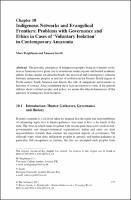Chapter 10 Indigenous Networks and Evangelical Frontiers: Problems with Governance and Ethics in Cases of ‘Voluntary Isolation’ in Contemporary Amazonia
Author(s)
Brightman, Marc
Grotti, Vanessa
Collection
WellcomeLanguage
EnglishAbstract
The periodic emergence of indigenous peoples living in voluntary isolation in Amazonia have given rise to sensational media reports and heated academic
debate. In this chapter we describe briefly the historical and contemporary relations
between indigenous peoples in and out of isolation in the Guiana Shield region of
North-eastern South America and discuss the role of indigenous missionaries in
histories of contact. After considering these facts in relation to some of the general
debates about isolated peoples and policy, we assess the ethical dimensions of the
question of emergence from isolation.
Keywords
anthropology; anthropology; Akurio people; Amazon rainforest; Brazil; Evangelicalism; Hunter-gatherer; Indigenous peoples; Indigenous peoples in Brazil; Missionary; The Guianas; Uncontacted peoplesDOI
10.1007/978-3-319-42271-8_10ISBN
9783319422718OCN
1127794788Publisher
Springer NaturePublisher website
https://www.springernature.com/gp/products/booksPublication date and place
2017Grantor
Classification
Anthropology


 Download
Download